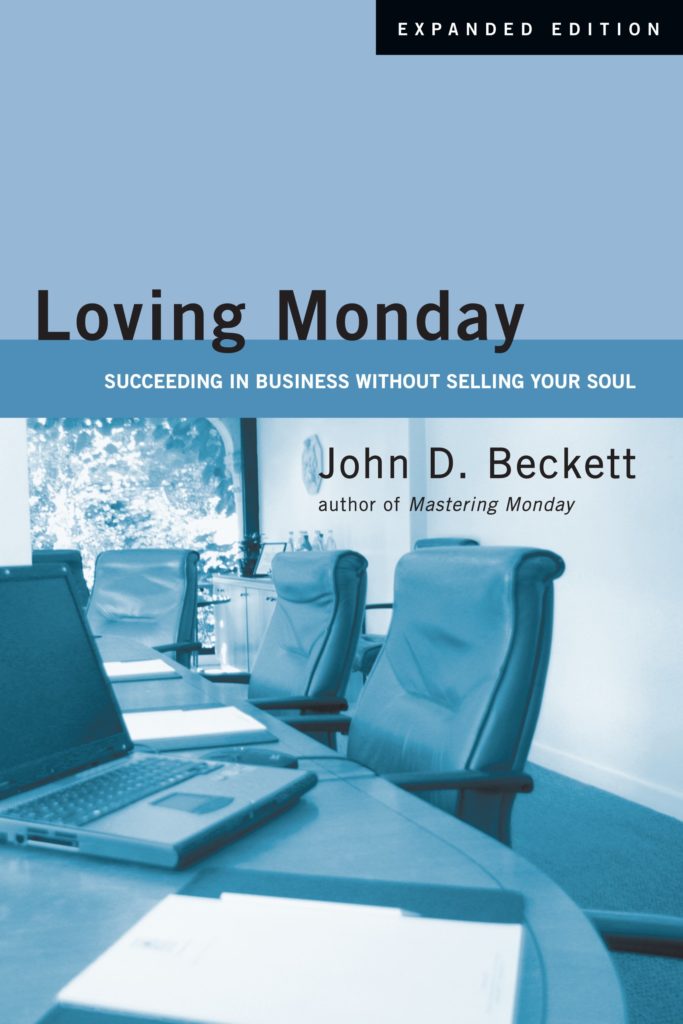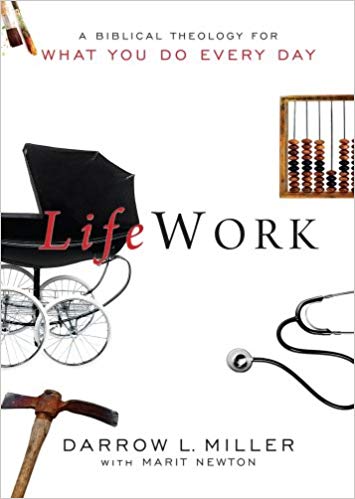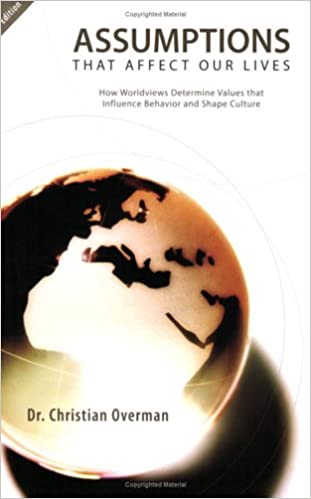At a Glance
Living a godly life is always hard, but it is made harder when the area we spend most of our time—at our jobs, in the workplace—does not seem to have anything to do with what we believe. How can we live spiritually fulfilling lives in a secular environment? John Beckett, author of Loving Mondays: Succeeding in Business Without Selling Your Soul joins us today to discuss how to break the sacred/secular divide and realize that God has called us to work and given us the tools we need to do it well.
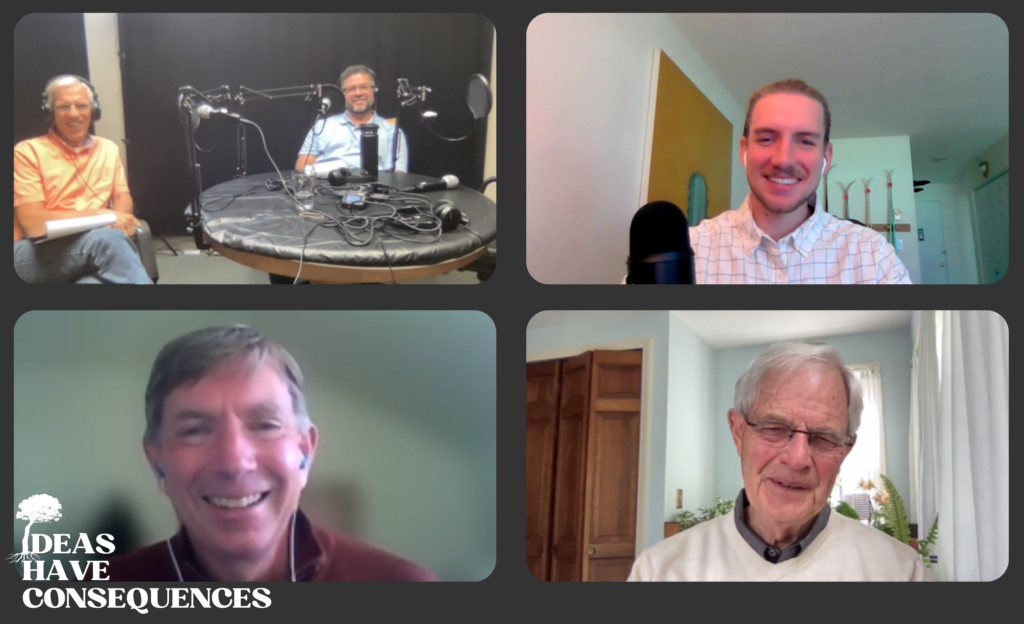
What You'll Hear
Chapter 1: John Beckett’s Journey (1:31)
- John is very involved in church and business.
- He was hardwired for the engineering field, but when he went into engineering after college he felt like he was disappointing God somehow because it was not spiritual.
- God told him that He had called John into business, and expected him to do it with all his heart.
Chapter 2: Integrating Faith into the Workplace (17:52)
- Not just being a faithful Christian at work, but asking how the Bible applies to workplace situations.
- When coming against a tricky situation, instead of drawing on your own experience and wisdom, ask what God wants you to do.
Chapter 3: The “Greek” mind (31:27)
- Ancient Greek philosophers saw the spiritual world as perfect and the material world as flawed.
- God created the world to be good.
- Biblical figures like Nehemia, Joseph, Daniel, and even Jesus worked and made a difference through their “secular” work.
Chapter 4: Principles and Practical Applications (38:08)
- God owns the business
- We bring God’s kingdom to earth
- John used Matthew 18 to help two employees who were at odds with each other work it out.
- The principle of working for the Lord led to a standard of excellence at the company.
- Realizing employees and coworkers were created in God’s image led to the principle of “profound respect for the individual” in the workplace.
Chapter 5: Being Different from the World (55:16)
- It requires not only different actions but a different way of thinking.
Chapter 6: Personal Stories (1:01:09)
- A work discussion of the company’s values led back to their biblical roots.
- An intern accepts Christ in John’s office.
Chapter 6: “Woke” Culture (1:05:40)
- True and important things are being added on to the gospel message and taking over.
- We need to be aware and look to the Scriptures for what is true.
Using the link above, you can read the transcript, listen along, and adjust the speed of the podcast while you listen.
I had a strong sense that the Lord spoke to me during that period of time and in essence, he said, ‘John, I've called you into business. I want you to do it with all your heart.’
14:23
Special Guest
John D. Beckett was born and grew up in Elyria, Ohio. He graduated from M.I.T. in 1960, after which he worked as an engineer in the aerospace industry.
In 1963, he joined his father’s small manufacturing business and became president in 1965 upon the death of his father. The company has grown to become a worldwide leader in producing engineered components for residential and commercial heating. With its affiliates, the company employs some 1,000 people.
Mr. Beckett has long been active in both church and community-related activities. He helped found Intercessors For America, a national prayer organization, in 1973 and continues to serve on its board. He is a founding board member of The King’s College in New York City and serves on the board of Cru (Campus Crusade for Christ International).
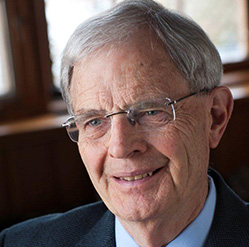
His first book, Loving Monday: Succeeding in Business Without Selling Your Soul, was published in 1998, and is now available in twenty languages. A second book, Mastering Monday: A Practical Guide to Integrating Faith and Work, was released in July 2006.
Mr. Beckett received honorary Doctor of Laws degrees from Spring Arbor University in 2002 and The King’s College in 2008. He has also been named “Christian Businessman of the Year” by the Christian Broadcasting Network (1999) and manufacturing “Entrepreneur of the Year” by Ernst & Young (2003.)
He resides in Elyria, Ohio with his wife, Wendy, to whom he has been married since 1961. They have six children and eighteen grandchildren.
Go Deeper
LifeWork
A Book by Darrow Miller
The purpose of this book is to help Christians begin to reconnect their lives and their work to the advancement of God’s Kingdom. A key for achieving this is developing a biblical worldview that enables us to understand our work in terms of calling and vocation, and thus live our lives in a way that more consistently glorifies God.
Assumptions that Affect Our Lives
A Book by Christian Overman
This book changed how John Beckett thought about work. It traces the foundation of Western thought back to two opposing worldviews: the ancient Greeks, who fathered man-centered secularism, and the ancient Hebrews, who carried forward the revelation of God.
Monday Church
Free Online Course from Disciple Nations Alliance
The Church is not a building or a Sunday-morning activity; it is the Body of Christ on mission in every sphere of society, every day of the week. Monday Church explores the greatest tool God has given you to impact the world: your work. God intends for your daily work to be for the service of man, the blessing of the nations, and the glory of God.
Monday Church provides a biblical framework for each of us to establish a meaningful, integrated understanding of our life and work. Whatever your work or vocation, God calls you to a new way of living — fully in His presence and for His glory.
Watch videos, read articles, take quizzes, and more at your own pace or in a group to learn how the Bible impacts your work.
Quotes
“Almost everyone is going to say, yes, we acknowledge the Lordship of Jesus. I know very few Christians that wouldn’t say something like that. But practically, we’ve been coming out of a time in the history of the church where Christians have kind of lived in two worlds. Firstly, a faith world that centers around church and Bible study and personal piety or matters of personal holiness. And that world sometimes can be very disconnected from what people might term the secular world, the world of politics and of business and entertainment, and pretty much everything else that happens outside of church.” Scott (7:52)
“I had a strong sense that the Lord spoke to me during that period of time and in essence, he said, ‘John, I’ve called you into business. I want you to do it with all your heart.'” John (14:23)
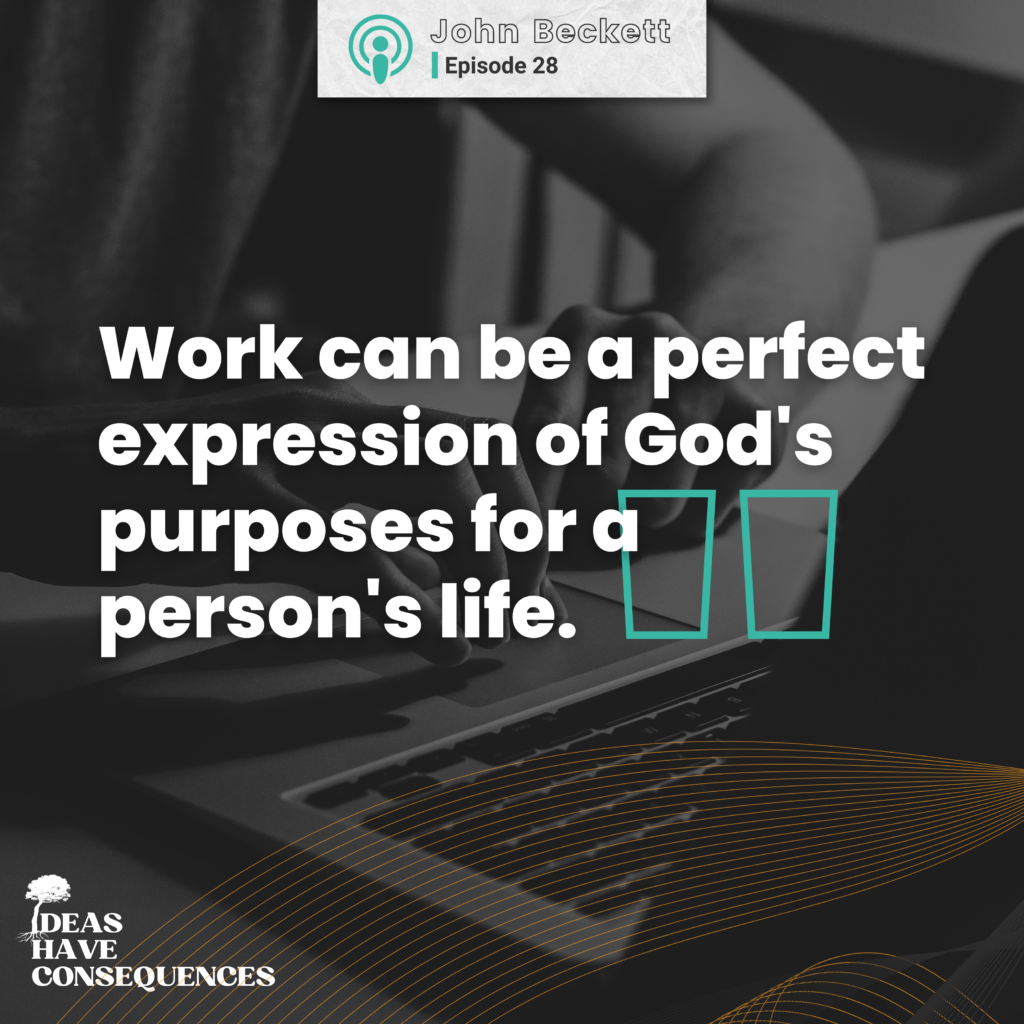
“Realizing I should not live what was a bifurcated life was a radical shift in thinking. If I hadn’t been a proper Episcopalian, I would have done cartwheels.” John (19:24)
“There have been others who have sought to walk faithfully as believers in the workplace. But that’s not quite the same as trying to practically integrate the sacred and secular, where you take a biblical truth and say, ‘How does this apply in a workplace situation?’ Or the inverse, you take a gnarly workplace situation and say, ‘Well, how does the Bible speak to this?'” John (23:42)
“”When we come up against a problem, we have a choice at that point: what are we going to draw from to try to resolve that problem? And at that juncture, the two primary options for the believer are to draw from what we know: conventional wisdom; experience; what we’ve learned academically; whatever, or to say, ‘God, how should I be thinking about this from your perspective?'” John (27:59
We don’t take a moment to pause and say, ‘Well, God, what’s your perspective on this?’ And once we start asking the question that way, we poise ourselves to hear something from him. It may come through a scripture, it may come through an impression, it may come through somebody else commenting to us in a way that helps us think about it. But that’s the pivot point. That’s the point at which we set our minds to hear from God or just do it in our own strength.” John (29:09)
“But there isn’t this notion in this worldview that work can be a perfect expression of God’s purposes for a person’s life. Even the theologians can overlook what Nehemiah did, as the cup bearer to the king. Or what Joseph did, as an administrator in a vast kingdom in Egypt. Or what Daniel did, secular work for several different heads of state, and on and on. Or even what Jesus did for maybe three or four times the length that he was a rabbi, working in a carpenter shop.” John (35:37)
“It’s the idea that there is a place, we’ll call it heaven, where there’s a divine blueprint. There is a divine intent, and to somehow see that expressed in the time-space world in which we live. And the more that we can be vehicles through whom that occurs, the more we’re going to see the practical outworking of what Jesus gave his disciples, we call it the Lord’s Prayer, ‘Thy kingdom come, thy will be done, on this created fallen earth as it is in heaven.’ Well, that’s a mission field all on itself. That can take any person who seeks to follow the Lord in such a multitude of directions, all of which can be service to the Lord in His kingdom. And that certainly includes the workplace.” John (42:12)
“The Bible is not just a depository of the truth, it is the truth.” John (46:57)
“It takes a certain tenacity to say no to the world and the way it pressures us to be different—in the right kinds of ways. To be different in our language and our thought, and how we love people instead of use people.” John (57:46)
“We have to be very careful with what we say is the truth. Because ‘the truth plus’ is probably not the truth. ‘The truth plus’ is going to be some diversion from the truth. And so that takes discernment, it takes a biblical understanding of what God’s design really is. Because these ‘added-to’s become an aberration that is directly opposed to the gospel. That’s where they end up.” John (1:08:28)
“The antidote to cultural lies is also in the Scriptures. And it’s found in Second Thessalonians, that they had a passionate love for the truth. That was the antidote. The way to avoid error is to have a passionate love for the truth.” John (1:09:51)
“If I can say to your readers, something that was put to me decades ago as a personal challenge, it was to take up the challenge of reading the scriptures for at least five minutes a day. Now, at the time, that seemed like a simple thing to do, but because it was put in the form of a challenge, and I like challenges, I took it on. Was that easy? Initially, it was like pulling teeth to follow that discipline, but I’ve made a commitment, I was going to do it. And at a certain point—it didn’t take that long—the duty became a delight.” John (1:14:03)

